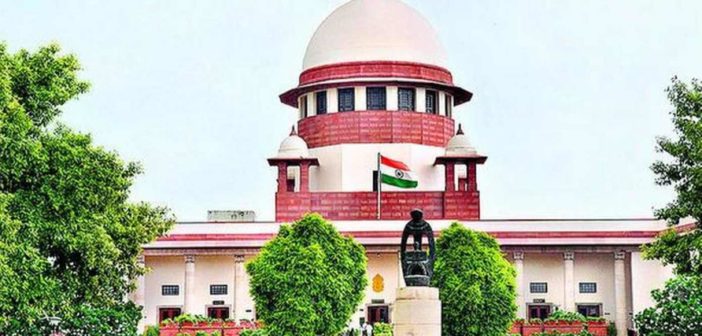In this roundup of the Court Judgements, we look at the Supreme Court’s observations & directions about the OROP scheme, that a magistrate can summon persons who have not been named in chargesheet or FIR provided there is material indicating their involvement, that negligence cannot be treated to be misconduct in a case involving a judicial officer, all angles must be considered while considering petitions for the expedition of trial.
SC: There is no legal mandate that pensioners who held the same rank must be given the same amount of pension
‘One Rank One Pension’ or ‘OROP’ is defined as the payment of uniform pension to armed services personnel retiring in the same rank with the same length of service, irrespective of the date of retirement, according to the Union Government’s definition as per the scheme’s notification released in 2015. It stipulates the following:
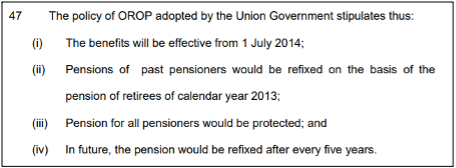
In Indian Ex Servicemen Movement vs. Union of India & Others, the ex-servicemen association filed a plea in 2016 seeking implementation of the OROP Scheme as per the recommendations put forth by Koshyari Committee with an automatic annual revision based on the 2014 salary of ex-servicemen. In the current policy, a periodic review is conducted once in five years based on 2013 salaries. The plea also claimed that different pensions were given for the same rank depending on when the person retired. For instance, a Sepoy who retired prior to 31 December 2013 would get a monthly pension of Rs. 6,665 and another Sepoy (Group Y) who retired on or after 1 January 2014 would get Rs. 7,605 per month which implies that two soldiers who served for the same length of years, holding the same rank will draw a different pension.
The Supreme Court Bench of Justices DY Chandrachud, Surya Kant, and Vikram Nath dismissed the challenge noting that there is no legal mandate that pensioners who held the same rank must be given the same amount of pension. Moreover, some personnel may be entitled to varying benefits which also affects the pension payable. This need not be equalized with the rest of the personnel. Citing various principles, the bench stated that they could not find any constitutional infirmity in the OROP principle adopted. With respect to the definition of policy, the Bench stated that it was not arbitrary. Stating that a re-fixation exercise should be carried out from 1 July 2019, upon the expiry of five years, the Bench also ordered that all arrears payable to eligible pensioners of the armed forces should be paid within three months.
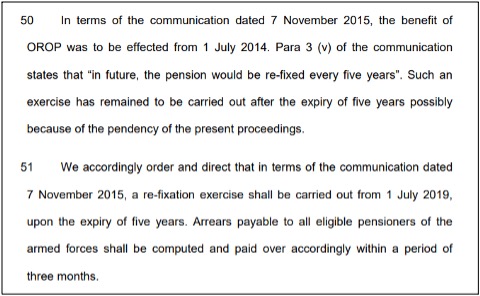
SC: Magistrate can summon persons who have not been named in chargesheet or FIR provided there is material indicating their involvement
In Nahar Singh vs. State of Uttar Pradesh, the question considered was if the Magistrate can issue summons to any person who was not named in the chargesheet. In this case, the prosecutrix victim who was recovered by the Investigation Officer on 10 May 2012, in her initial statement under Section 161 of CrPC on the same day disclosed that the accused Yogesh had raped her. Later, in her statement before the Additional Chief Judicial Magistrate under Section 164, she disclosed the names of Rupa, Yogesh, and the appellant Nahar Singh. The appellant’s name was not disclosed by the prosecutrix in her statement made under Section 161 CrPC alongside other co-accused persons, Yogesh and Rupa whose names were in the chargesheet.
The Chief Judicial Magistrate (CJM) passed an order in 2012 that there is no ground to summon the appellant Nahar Singh for trial. Later, in 2015, the CJM passed an order issuing summons for trial. This order was challenged by the appellant in the Sessions Court, which was dismissed. He then approached Allahabad High Court which stated that “the well-established principle of criminal jurisprudence that cognizance taken by the Magistrate is of an offence and not of an offender.” That is, if the Magistrate found evidence to support the allegations against persons who have not been chargesheeted, the Magistrate should summon them.
While hearing the plea filed by the appellant, the two-member bench of justices Vineet Saran and Aniruddha Bose upheld the Allahabad High Court’s decision. The Bench said that if there are materials before the Magistrate which indicate the involvement of those persons who have not been mentioned in the chargesheet, then the Magistrate can summon such persons. However, the Magistrate must examine the materials available before them (which need not be those confined to the police report, charge sheet, or the F.I.R) including the statement made under Section 164 of CrPC, before issuing summon orders.
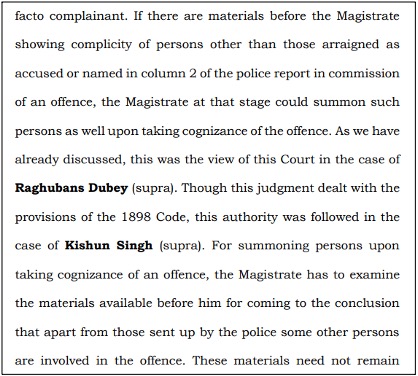
SC: Negligence cannot be treated to be misconduct
In Abhay Jain vs. High Court of Judicature for Rajasthan, the appellant was an ex-judicial officer. He had joined as a judicial officer in 2013 and was discharged from service three years later in 2016, after a complaint against him that he had passed a bail order with some ulterior or oblique motives and for extraneous considerations. The full court had also observed that his services during the probation period were unsatisfactory. In 2016, the appellant filed a writ petition before the Rajasthan High Court to quash the orders which removed him from service and end all proceedings against him. He also sought reinstatement with consequential benefits. However, the Rajasthan High Court dismissed the writ petition.
He then appealed before the Supreme Court stating that the charges filed against him were vague in nature and that absolutely no details were provided about the allegation against him of passing the bail order with ulterior motive and extraneous considerations. The Supreme Court Bench comprising Justices Uday Umesh Lalit, and Vineet Saran also noticed that the appellant was not given a chance to improve as he was not informed of his unsatisfactory performance. With regards to the bail order passed, the Bench noted that there was no detail as to what the extraneous consideration or ulterior motive was, and so it was merely drawn out of suspicion. There was no complaint or any other material to back the allegations. To establish any ‘probability’ of misconduct, there should be oral or documentary material to support it which is absent in this case.
The Bench held the appellant guilty of negligence for not reading the case file carefully as he missed the notice of the order of the High Court on his file. However, this negligence was not to be considered misconduct. Allowing the appeal, the Bench directed that the appellant be reinstated with all consequential benefits like the continuity of service and seniority but will be entitled to be paid only 50% back wages, which may be paid within a period of four months.
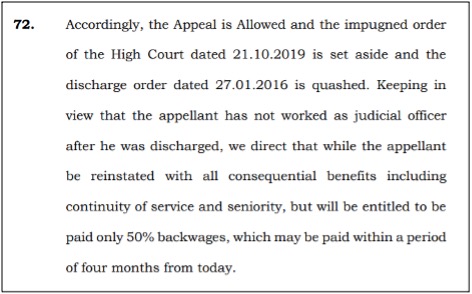
SC: All angles must be considered while considering petitions for expedition of trial
In M Gopalakrishnan & Others vs. Pasumpon Muthuramalingam & Another, the SC considered an SLP against Madras High Court’s order of directing the Trial Court to expedite the proceedings and close a trial within 6 months, without even joining the accused persons as parties.
The bench comprising of Justices Dinesh Maheshwari and Vikram Nath calling the order innocuous stated that before passing any such order for expeditious proceedings in a particular case, the higher court must keep in mind that the calendar and schedule of the subordinate Court would be disrupted due to such orders unless there are compelling reasons. Such petitions which call for expedition of trial must be examined from all angles, it added while dismissing the petition.
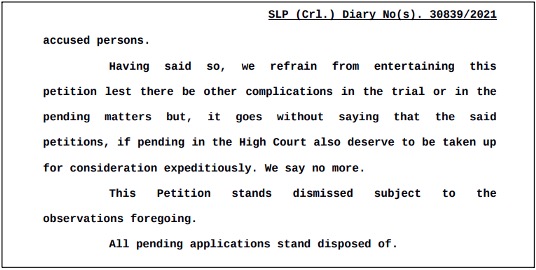
Chhattisgarh HC: Illegitimate son/daughter is also entitled to compassionate appointment
In Piyush Kumar Ancha vs. State of Chhattisgarh & Others, the petitioner’s father who worked in the Chhattisgarh State Warehousing Corporation had died due to COVID-19 infection and the petitioner had applied for the job on compassionate grounds. He was the son of the deceased’s second wife whose name was also recorded in the nomination form submitted by his late father. However, his application was rejected on grounds that he had not filed a valid succession certificate. Suresh Kumar Anchal, the son of the deceased with his first wife, had also claimed a compassionate appointment.
Referring to past judgements and circulars, the Court noted that if a widow/widower of the deceased Government servant is not eligible, only then the son/adopted son would be entitled to consideration, and in absence of that, the daughter/adopted daughter would be entitled to consideration. Even an illegitimate son/daughter is also entitled to a compassionate appointment. However, referring to past cases, the Court noted that compassionate appointment is to be considered in order of seniority- the elder will be given the first priority and only if his case is rejected, then the case of the younger brother is to be considered. The High Court directed the corporation to consider the applications of both, Piyush and Suresh for compassionate appointment and decide on merit within 45 days.


